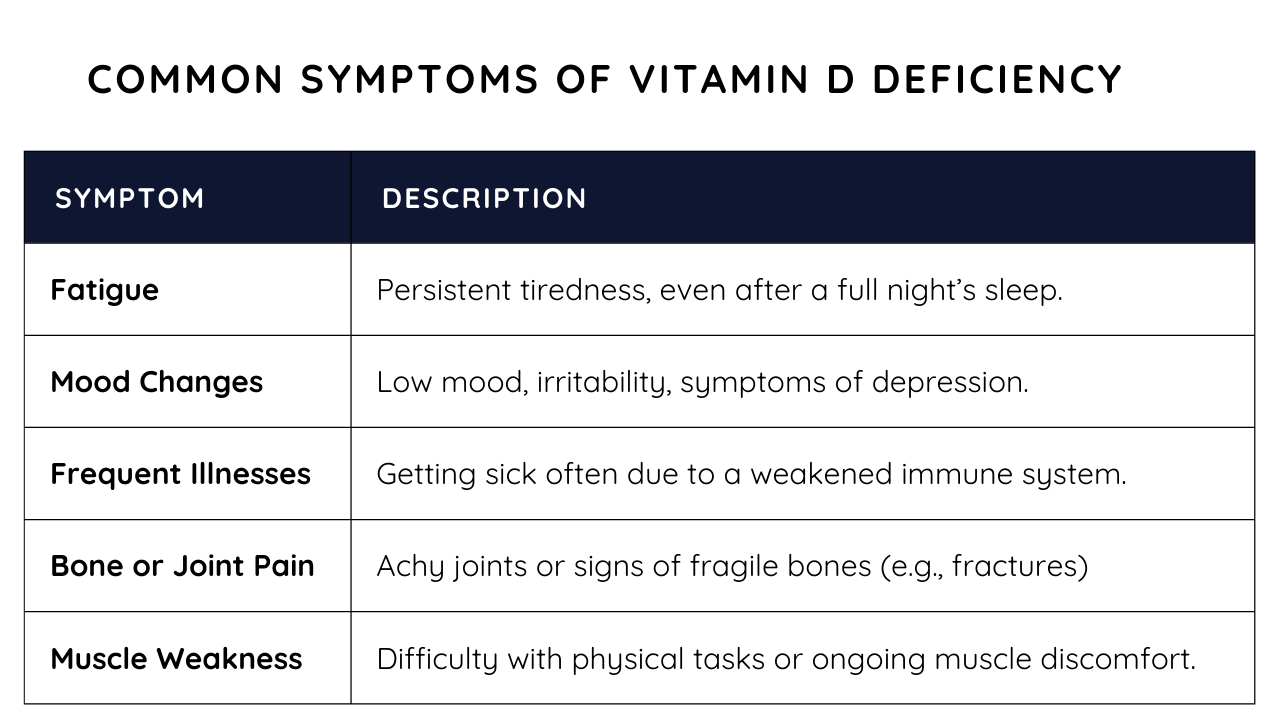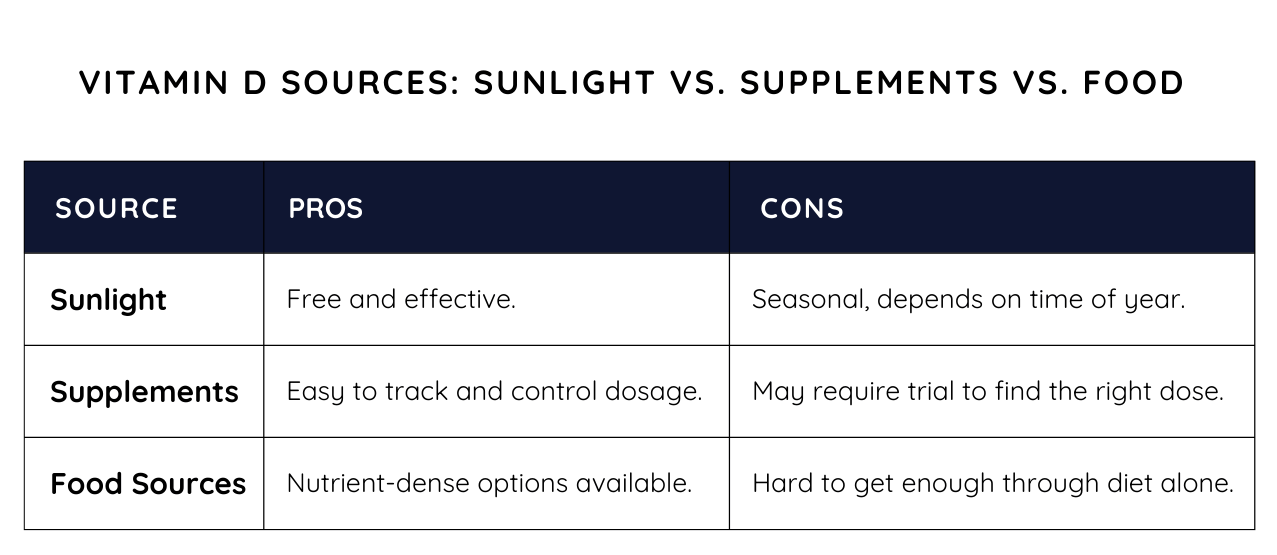Do you wake up feeling drained, no matter how much sleep you get?
Or find yourself battling constant colds and feeling emotionally off-balance?
For millions, these could point to a common issue: Vitamin D deficiency. Known as the "sunshine vitamin," this essential nutrient fuels your energy, stabilizes your mood, and supports your immune defenses.
Despite its importance, over 40% of Americans are deficient.1 Why? Because Vitamin D relies on sunlight, certain foods, and sometimes supplements—not just a balanced diet.
The good news? A few simple changes—like more time in the sun, smarter food choices, or the right supplement—can make all the difference.
We’ll break down how Vitamin D fuels your energy, the warning signs of deficiency, and the easiest ways to boost your levels for better health.
7 Reasons Vitamin D Is Critical for Your Health
Often underestimated, Vitamin D drives essential functions—from immediate boosts in energy and mood to long-term protection against chronic conditions.
1. Powers Your Energy
Feeling perpetually drained? Vitamin D fuels your cells’ energy generators, helping you stay productive and energized throughout the day. Addressing a deficiency has been shown to significantly improve fatigue, giving you the stamina to power through life.2
2. Enhances Your Mood
Mood swings and emotional lows aren’t always “just stress.” Vitamin D plays a key role in serotonin production—the hormone responsible for emotional balance.
Studies link higher Vitamin D levels to reduced depression symptoms and improved Seasonal Affective Disorder (SAD).
In a podcast discussion with Peter Attia, Dr. Andrew Huberman highlighted how 'bright light exposure in the morning is an established treatment for SAD. He recommended using SAD lamps that emit over 10,000 lux of light to mimic natural sunlight during those gloomy winter months. It’s like giving your brain a boost of sunshine when nature doesn’t cooperate—helping to regulate mood and mimic the natural sunlight your body needs for Vitamin D production.
3. Strengthens Immune Defenses
Vitamin D activates T-cells, your body’s first line of defense against illness. Adequate levels have been shown to reduce respiratory illness severity by up to 50%, helping your immune system perform at its best. For instance, a 2017 meta-analysis published in The BMJ found that Vitamin D supplementation reduced the risk of acute respiratory infections, particularly in individuals with a deficiency.3
Dr. Michael Holick, a leading Vitamin D expert, emphasizes:
"Vitamin D is essential for activating the immune system's ability to fight infections, making it critical for both immediate and long-term health."
4. Keeps Bones Resilient
Partnered with calcium, Vitamin D maintains bone strength and lowers the risk of osteoporosis. Deficiency makes bones fragile, but meeting your daily needs keeps them durable and healthy.⁴
5. Protects Against Chronic Disease
Vitamin D does more than boost your mood and energy—it helps protect against chronic conditions by reducing oxidative stress and supporting cellular repair.
For example, studies suggest that adequate Vitamin D levels may lower the risk of type 2 diabetes, thanks to its anti-inflammatory effects and role in metabolic health.
It also plays a critical role in immune system regulation, which may explain its potential to reduce the risk of autoimmune conditions like multiple sclerosis.
The takeaway? Vitamin D is essential for long-term health—not just today but for years to come.
6. Brain Health and Focus
Even a mild Vitamin D deficiency can impact your focus, memory, and emotional well-being. Research published in the Journal of Nutrition, Health & Aging shows that Vitamin D plays a critical role in reducing brain inflammation, sharpening cognitive function, and even protecting against neurodegenerative conditions.7
7. Reduced Inflammation
Vitamin D plays a critical role in managing chronic inflammation. Its anti-inflammatory properties reduce the risks of cardiovascular disease and diabetes, supporting long-term health.5
Expert Insights on Vitamin D
For a deeper understanding of how vitamin D impacts your brain and body, watch this engaging video from Dr. Michael Holick, a leading expert in the field. Dr. Holick explores how this nutrient supports cognitive function, emotional stability, and overall well-being.
How Do You Know If You’re Deficient in Vitamin D?
Vitamin D deficiency is more common than you might think. The CDC reports that one in four Americans may not have enough Vitamin D, and 8% are at risk of serious deficiency.6
Common Risk Factors
Several factors contribute to deficiency:
- Spending too much time indoors or living in areas with limited sunlight.
- Darker skin tones naturally produce less Vitamin D because increased melanin reduces UVB absorption.
- Diets low in fortified foods or fatty fish.
- Health conditions like Crohn’s disease, celiac disease, or obesity that impair absorption.

3 Simple Strategies to Boost Your Vitamin D Naturally
Finding ways to improve your Vitamin D levels doesn’t have to be complicated. Your lifestyle, location, and diet all play a role, and small adjustments can make a big difference. Here’s how:
1. Spend Time in the Sun
Sunlight is one of the simplest and most effective ways to boost your Vitamin D levels. However, your ability to produce Vitamin D from sunlight can depend on several factors:
- Location and Seasons: If you live in northern latitudes or experience long winters, your exposure to sunlight may not be enough to maintain healthy Vitamin D levels. In these cases, supplements or fortified foods can help fill the gap.
- Time Spent Outdoors: Spending too much time indoors can also limit your Vitamin D production. Aim for short bursts of midday sunlight when UVB rays are strongest, or try morning sun exposure to maintain healthy levels without risking sunburn.
Pro Tip: Sunlight’s Double Duty
Dr. Nerina Wilkinson emphasizes how sunlight does more than boost Vitamin D—it also supports skin health by managing conditions like psoriasis. Just a few minutes of daily sun exposure can elevate your mood, boost your energy, and help your skin thrive.
2. Consider Supplements
When sunlight isn’t an option, supplements can provide a reliable alternative. However, the right dosage depends on individual factors like age, health, and lifestyle.
- Testing Levels: A simple blood test (25-hydroxyvitamin D) is the best way to assess whether you need supplements.
- Pair with Nutrients: To maximize Vitamin D absorption and effectiveness, pair it with magnesium and Vitamin K2. These nutrients help regulate calcium in the body, preventing potential complications and enhancing the overall benefits of Vitamin D.
3. Add Vitamin D-Rich Foods
Food can be a great source of Vitamin D, especially when combined with sunlight or supplements:
- Fatty Fish: Salmon, mackerel, and tuna are excellent sources.
- Egg Yolks: A simple, versatile addition to meals.
- Fortified Foods: Check labels for Vitamin D-enriched milk, orange juice, or cereals.
- Mushrooms: Varieties like maitake or shiitake naturally contain Vitamin D.
Expert Insights on Vitamin D
Vitamin D is essential for your overall health, influencing everything from your immune system to your energy levels. In this video, Dr. Ken Berry explains why Vitamin D deficiency is so widespread and shares simple, practical steps to help you improve your levels.
Why It’s Important: Dr. Berry’s down-to-earth advice makes it easy to take actionable steps toward better health.
Comparison: Sunlight vs. Supplements vs. Food Sources
What’s the best way to get vitamin D? It depends on your lifestyle and needs. Here’s a quick comparison:

3 Common Myths About Vitamin D—Debunked
Despite its importance, Vitamin D is surrounded by misconceptions. Let’s clear up the most common myths:
Myth #1: You Get All the Vitamin D You Need From Sunlight
Sunlight is a fantastic source, but it’s not always enough. Factors like sunscreen, skin tone, and time of year all influence how much Vitamin D your body can produce.
Myth #2: It’s Just About Bones
Vitamin D is often associated with bone health, but its benefits go far beyond that. It powers your immune system, stabilizes your mood, and supports energy production.
Myth #3: More Is Always Better
While Vitamin D is essential for health, excessive supplementation can lead to serious health issues, such as nausea, kidney stones, and dangerous calcium buildup in the blood. According to the Mayo Clinic, these risks are rare but typically occur with consistently high doses over an extended period
Why Vitamin D Deserves Your Attention
Vitamin D might just be your body’s unsung hero—fueling your energy, stabilizing your mood, and keeping your immune system in peak shape. Yet, most of us don’t get enough of it.
Start today! Whether it’s stepping outside for a few minutes of sunlight, adding a Vitamin D-rich food to your meals, or exploring supplementation, small changes can lead to big improvements.
Curious where to begin? Explore our Learning Center for easy, actionable tips.

How Functional Medicine Treats Stress: A Step-by-Step Guide

How Functional Medicine Supplements Can Help with Weight Loss

Vitamin D Benefits: 7 Ways to Boost Energy, Immunity & Health


